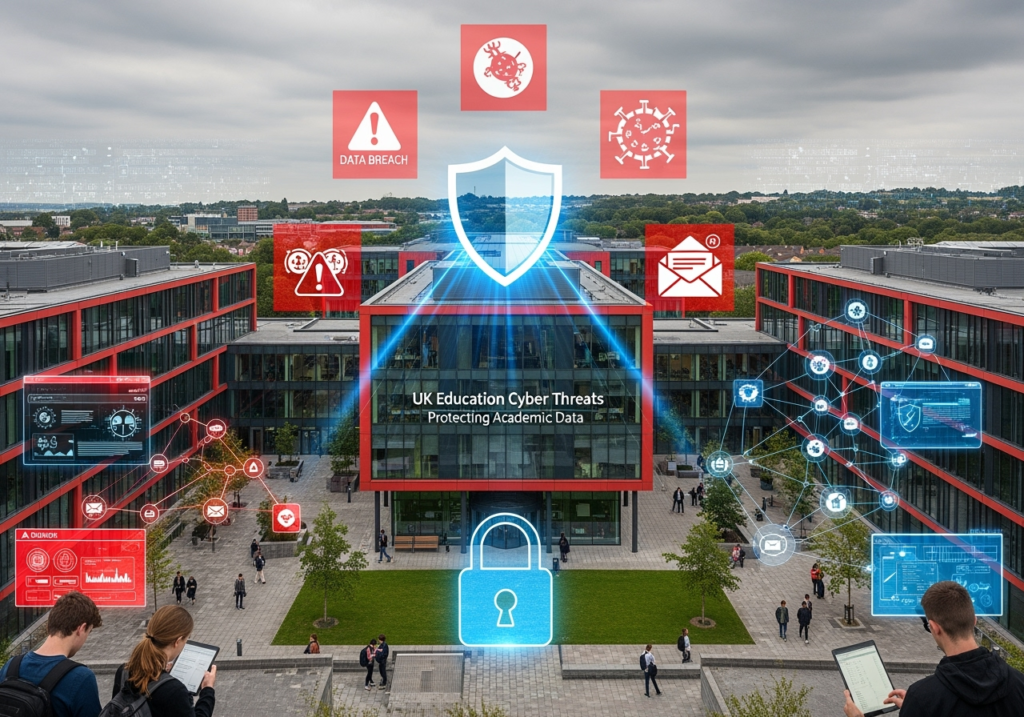How do Information Security Attacks put the UK Education Sector at risk?

How do Information Security Attacks put the UK Education Sector at risk?
A report has revealed that education was amongst the most-targeted sectors for data breaches in 2021. The UK’s National Cyber Security Centre (abbreviated as NCSC) notified schools, colleges, and universities of a major rise in ransomware attacks as cyber-offenders look to exploit gaps in previously protected networks, destabilized by distance learning requirements. Again a 2020 survey of IT specialists at educational establishments showed almost nine out of 10 assumed they might have security gaps due to the quick move to remote working.
Over the past years, the education segment in the UK has observed many similar issues that all kinds of industries face across the world. The 2021 Threat Landscape Retrospective report put forward that nearly 13% of breaches were related to the education segment, with students, educators, and guardians affected through canceled sessions and unapproachable learning platforms. The increased rate of inter-connectivity of various systems and networks has unquestionably increased productivity in work, although it has also paved the way for information security attacks.
There are different kinds of classified, confidential, and personal information that educational institutes handle, and as many educational administrators will confess, systems, approaches, and practices of managing personal information are not always secure. Intensifying this issue is the fact that a large number of schools do not train and instruct non-IT workers in cyber security.
“As the dependence on digital solutions in educational institutions has increased, the need to secure these technologies from Information Security Attacks at the UK Education Sector has also developed.
Facts
- Research shows that approximately 69% of educational institutes (schools) surveyed have faced a phishing attack, while 35% have gone through periods with no access to vital information.
- A 69% increase in cyber-attacks initiated against schools was mostly seen during 2017-2018.
- The worldwide education sector observed a 29% rise in cyber-attacks, and an average of roughly 1,739 occurrences every week, in 2021, as compared to the first half of 2021
- The countries with the highest number of attacks were India, Italy, Israel, Australia, and Turkey
- UK/Ireland/Isle-of-Man area faced a 142% increase in weekly cyber-attacks affecting the education sector; while the East Asia area recorded a 79% increase
- 69% of educational institutes underwent a phishing attack. Although many of these occurrences were unsuccessful, it’s assessed the open rate of phishing emails in schools is around 2%
- Just 35% of schools examined and surveyed train and instruct non-IT workforces in cyber security, implying that two-thirds of school employees are predisposed to information security attacks
- Only around 41% had a business endurance plan. In the due course of a ransomware attack, processes would possibly stop moving forward
- Only 49% of institutes were confident of their preparedness about cyber-attacks
Top 3 Threats to UK Educational Institutions
Data Breaches
A data breach refers to accidental or unlawful damage, loss, change, unsanctioned disclosure of, or data accessibility. A breach can happen in different forms, for example, the unauthorized access to a database or data bank, as can happen in the case of a hack, or the unplanned loss of a physical storage device, for example losing a USB drive in a public transport. every organisation needs to understand the importance of investing in all-encompassing and complete information security awareness training, including appropriate encryption practices, different types of data and the accountabilities that come with owning/handling them, and the way to ensure the confidentiality, integrity, and availability ( abbreviated as CIA) of data.
Phishing
Phishing attacks can differ wildly in complexity and their intentions; with some targeting to influence users into directly disclosing sensitive information, for example, log-in details, whilst others might be attempting to direct handlers to malicious URLs.
There are numerous significant practices to deal with phishing and reduce the probabilities of an effectual phishing attack:
- Be apprehensive and guarded of unsolicited emails, particularly if they contain assurances of prizes or unrealistic deals.
- Check and verify the email address. Generally, scammers will divert communications with addresses that intend to mimic the authentic article
- Be cautious of communications that plead urgency.
- Have preventive protocols and processes in place. Giving workforce business-specific technical assistance will help to lessen the risk
Ransomware
Awareness of ransomware increased greatly in 2018, following the WannaCry worm which infected around 200,000 computers and cost the NHS an estimated £92 million. According to the 2021, Landscape Retrospective report A “staggering” 52% of breaches in the education sector were the result of ransomware attacks. The vulnerability stemmed from the use of outdated IT systems and was likely introduced via a phishing attack.
It may sound simple, but in addition to anti-virus software, the easiest way to defend against malware is to avoid the point of infection. Having security-conscious users and staff adequately informed and trained in information security awareness issues will undoubtedly save time, energy, and more importantly: costs in the long term.
Stunited will keep you updated with all information of students’ news through different media platform.
Follow us on LinkedIn, Facebook, and Twitter for regular updates. Our community shares news to help the student & empower the society. Get internship CV from https://www.stunitedjobs.org/cv-templates
Know more about UK internship interviews here. https://stunitednewsfeed.org/sample-interview-questions-for-uk-students-in-2022/
To connect, share ideas, ask for suggestions, discover opportunities and get paid after solution for your higher education, sign up for Stunited.org
JOIN – Stunited.org, a dedicated social media for #higher #education #career
For career guidance, and for direct consultation with professionals,
Contact us
Phone:01604328800
Email:hr@stunitedjobs.org
#typesofcyber threats #Educationsector #datainterceptionandtheft #typesofattacksincybersecurity #typesofattackinnetworksecurity #typesofinternetthreats #phishingpreventionbestpractices #microsoftteamsphishingemail #onlineeducation #Securityriskinonlineeducation #informationsecuritychallengesinhighereducation #highereducation #Career #UKjobs #UKUniversity #Stunited #Stunited.org #StunitedNewsfeed #StunitedJobs





















